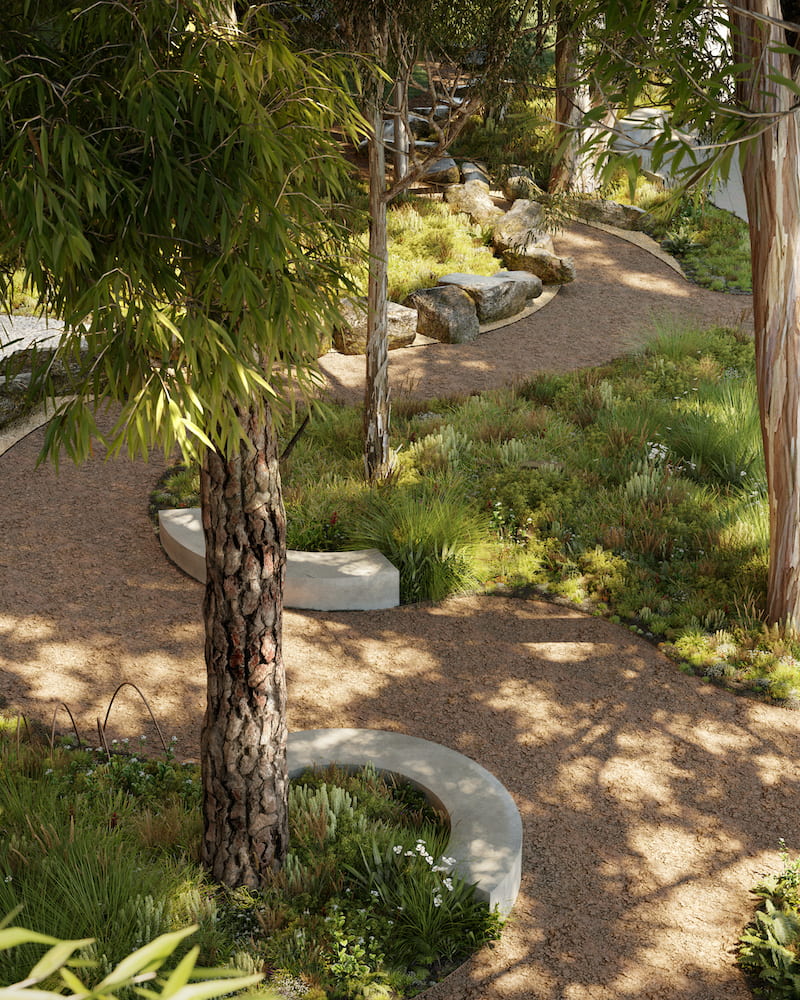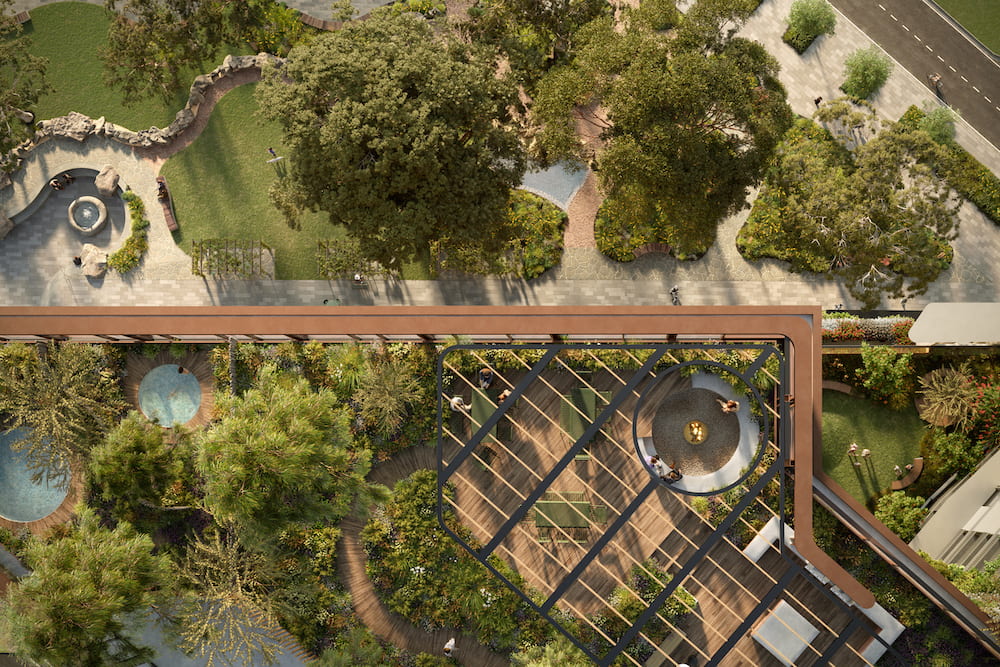Melbourne-first Miyawaki Forest set for Fishermans Bend
In a Melbourne-first, plans are in the works to permanently close Johnson Street in South Melbourne for a new public park that includes a Miyawaki Forest – a global phenomenon not seen before in an Australian urban park. The proposed urban forest will sit within a new 3,000m2 park, bringing much-needed green space to the rapidly evolving Fishermans Bend precinct.
The densely planted Miyawaki Forest will become its own urban ecosystem, with a vision to ‘rewild’ the heavily urbanised landscape and revegetate it back to its pre-colonial natural state by reintroducing native plants and attracting animal species.
The park is proposed to be delivered as part of The Canopy on Normanby, the new mixed-use development by Gamuda Land, which has officially received support from Port Phillip City Council.
Gamuda Land has engaged the global expertise of Miyawaki Forest experts SUGi Project to appoint a Melbourne forest-maker, in conjunction with local award-winning landscape architect OCULUS.
Gamuda Land has also sought guidance from Indigenous urban design advisors MURRI : YUL to embed First Nations narratives and meaningful conceptual themes into the park design to create an authentic and respectful place of gathering. Elements throughout the design are a subtle nod to the site before colonisation, such as the kangaroo footprints on the park floor, reflecting the kangaroo ground that once existed.
The negative impacts of urbanisation in Melbourne such as tree canopy loss, native habitat destruction, pollution, urban heat island effect, and general stress to wellbeing, are all symptoms of a city designed for cars, and at Fisherman’s Bend, heavy industry. This new urban forest will generate significant social and environmental benefits through the permanent shutdown of Johnson Street and the creation of dense bushland.
The Miyawaki method of planting, named after Japanese botanist Akira Miyawaki, results in plants growing 10 times faster than conventional urban planning. It is fast-tracking ecological succession by creating a multi-story ecosystem that will increase in complexity and biodiversity over a short time.
The forest-making method under Miyawaki techniques allows for the creation of a forest in any urban or rural setting that would generally take 200 years to establish.
Jarrod Tai, Gamuda Land General Manager in Australia said that Gamuda Land’s vision is to rejuvenate what has largely been an industrial area of Melbourne by implementing nature on a large scale.
“By establishing a Miyawaki Forest, we are creating a place that brings the community together, improves biodiversity and works to transport city dwellers to a highly dense forest while being in an urban setting,” said Mr Tai.
“The pocket forest will aim to increase biodiversity and Gamuda Land will tap into local experience from The Heart Gardening Project and Living Space Ecology to enhance habitat for pollinators and local bush birds.
“The project will contribute to the Melbourne Pollinator Corridor which aims to increase populations of native bees and other native pollinating insects, by planting 18,000 Indigenous plants in 200 gardens by the end of 2024” confirmed Mr Tai.
Elise van Middelem, Founder & CEO of SUGi Projects noted “our mission is to restore native ecosystems in cities around the world. This project underlines the essential role of nature in cities and provides an antidote to the monoculture tree planting we often see. Bringing nature closer for urban dwellers boosts health, wellness and a sense of serenity, in addition to myriad environmental benefits.”
SUGi Project has planted 195,445 native trees, funded 125 projects and restored 567 species across the globe, specialising in the rapid creation of urban pockets of forest.
Gamuda Land intends that the new open green space will become not only a sanctuary for residents and visitors of The Canopy on Normanby but a tranquil space for the entire Fishermans Bend community to enjoy and reconnect to nature.
“The Miyawaki Forest will provide much-needed green space in a rapidly regenerating precinct and will also create the opportunity to engage with local schools and community members in the planting and forest-making process. We envisage the community being the custodian of this park for generations to come” said Mr Tai.
Before colonisation, this site sat on the threshold between two unique vegetation types – herb-rich woodlands to the east and fresh-water wetlands towards the Yarra River to the north and west. The plant species Indigenous to these ecological vegetation classes have formed the basis of Gamuda Land’s palette for the park and the building.
Tim Mitchell, Senior Associate – Landscape Architect from OCULUS said “the Miyawaki Forest is about establishing an ecosystem – not just planting a garden. The forest will foster a resilient plant community that will cope with the pressures of a changing climate.”
“Our top priority was considering the most efficient way to achieve a lot in a relatively small space, so when Gamuda brought the concept of the Miyawaki Forest to the table we embraced it.
The incorporation of the park and Miyawaki Forest initiative contributes to Gamuda Land’s environmental initiative to plant one million trees by 2023. To date, Gamuda Land has planted over 300,000 trees around the world throughout its developments and townships.
As a dedicated town-maker, Gamuda Land creates places people will call home for generations to come, their extensive list of developments spans Malaysia, Vietnam, Singapore, London and Australia where each project fosters connections between residents through master-planned communities that feature parks, lakes, recreational activities and facilities, and commercial spaces.
Upon final approval, construction of the Miyawaki Forest and broader public park is anticipated to commence in June 2023 with anticipated completion by Autumn 2025.




